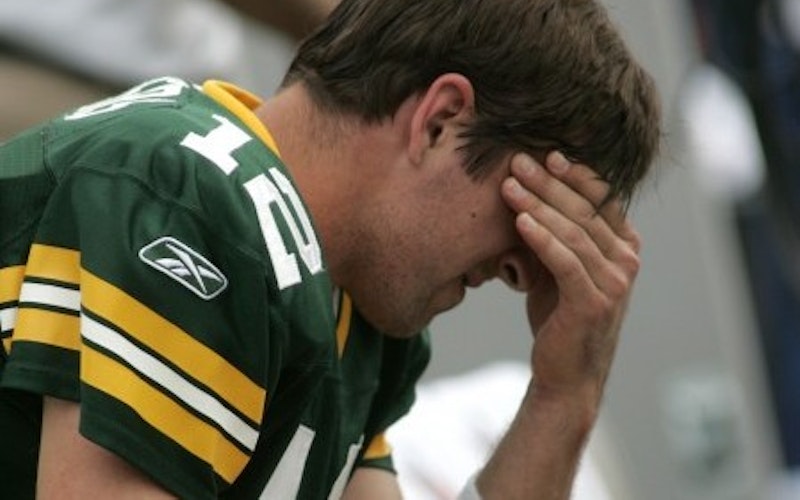
Culture At Large
Football and the Virtue of Tolerating Disappointment
As a Chicago Bears fan, it pains me to admit that one rival Green Bay Packer has inspired me to think.
Recently, ESPN the Magazine rana fascinating profile of Aaron Rodgers that focused on the quarterback’s “scars of disappointment.” Though now one of the NFL’s most widely respected starters, Rodgers did not have a smooth, painless path getting there. He was not recruited by Division 1 colleges and, instead, played his freshman year at a junior college. In the NFL draft, some analysts predicted he’d go number one. He was chosen with the 24th pick. Once in the NFL, he waited in the wings for three years behind Brett “Will-He-Won’t-He” Favre.
After setting up this history, ESPN's Tim Keown delivers this great paragraph:You know what Rodgers will tell you is an underrated virtue? The ability to tolerate disappointment. We’ve tried to eliminate disappointment, run it off like a deadly virus. The world’s most potent economy collapsed when too many people decided they couldn’t bear to be disappointed. They bought houses they couldn’t afford and cars they didn’t need. They believed that a parent’s most appalling failure is a disappointed child. Oh, we can’t disappoint the children! Lord forbid we allow our kids to be deprived. The dirtiest word in the English language: no.
Amen. In a culture that worships at the altar of instant gratification and happiness, we all too often focus only on the Right Now and fail to consider the Big Picture. Accordingly, one of the aspects of the Big Picture that’s then lost is how the unpleasant, the uncomfortable and the disappointing actually build character. I would hazard a guess that Aaron Rodgers would agree that without his “scars of disappointment,” he would not be who he is today—professionally or privately. Yet, ironically, this article on Rodgers’ character would have never been written if he didn't first gain our notice with performance. That's what grabs our attention. Character is not a valued or desired trait today. Performance, appeal and popularity are. We care about the surface—not the depth. How else do you explain why Brett Favre, Heidi Montag, assorted Kardashians and the Jet Blue guy are in our headlines? After all, character is difficult to weigh (it certainly doesn’t appear in game statistics or popularity ratings) and maybe even harder to sell. And so in the end, personal growth does not seem worth discomfort, pain and disappointment.
For Christ followers, there’s an obvious Big Picture behind every trial: God’s perfect will, which ultimately is to bring us to him and redeem this world from sin. Because of this, I believe the concept of tolerating disappointment becomes easier for Christians to comprehend. No, life doesn’t become easier. We aren't spared. And the church is not immune to disappointment avoidance. Still, an eternal perspective changes the overall view of temporary setback. In his book, The Hole in Our Gospel, Richard Stearns puts it so: “God doesn’t promise that all of his followers will be protected from hardship and suffering. Christians get cancer, lose loved ones, and suffer financial setbacks like everyone else. But God can use our tragedies to expand our territory in ways that show a skeptical world a different way to live.”
That "different way to live" rings through Scripture:
“I have learned to be content whatever the circumstances. … I have learned the secret of being content in any and every situation, whether well fed or hungry, whether living in plenty or in want. I can do everything through him who gives me strength” (Philippians 4:11-13, NIV).
“We also rejoice in our sufferings, because we know that suffering produces perseverance; perseverance, character; and character, hope. And hope does not disappoint us” (Romans 5:3-5, NIV).
“Don't shuffle along, eyes to the ground, absorbed with the things right in front of you. Look up, and be alert to what is going on around Christ—that's where the action is. See things from his perspective.” (Colossians 3:1-2, The Message).
Now, how do we share this trait with our culture? How do we chase avoidance of the uncomfortable from our churches? Martin Luther King, Jr. once dreamed that his children would be judged by the content of their character, but yet we are still judging by the surface. How can we put the focus on one’s character? Can that even be accomplished?
Topics: Culture At Large, Arts & Leisure, Sports, News & Politics, Social Trends